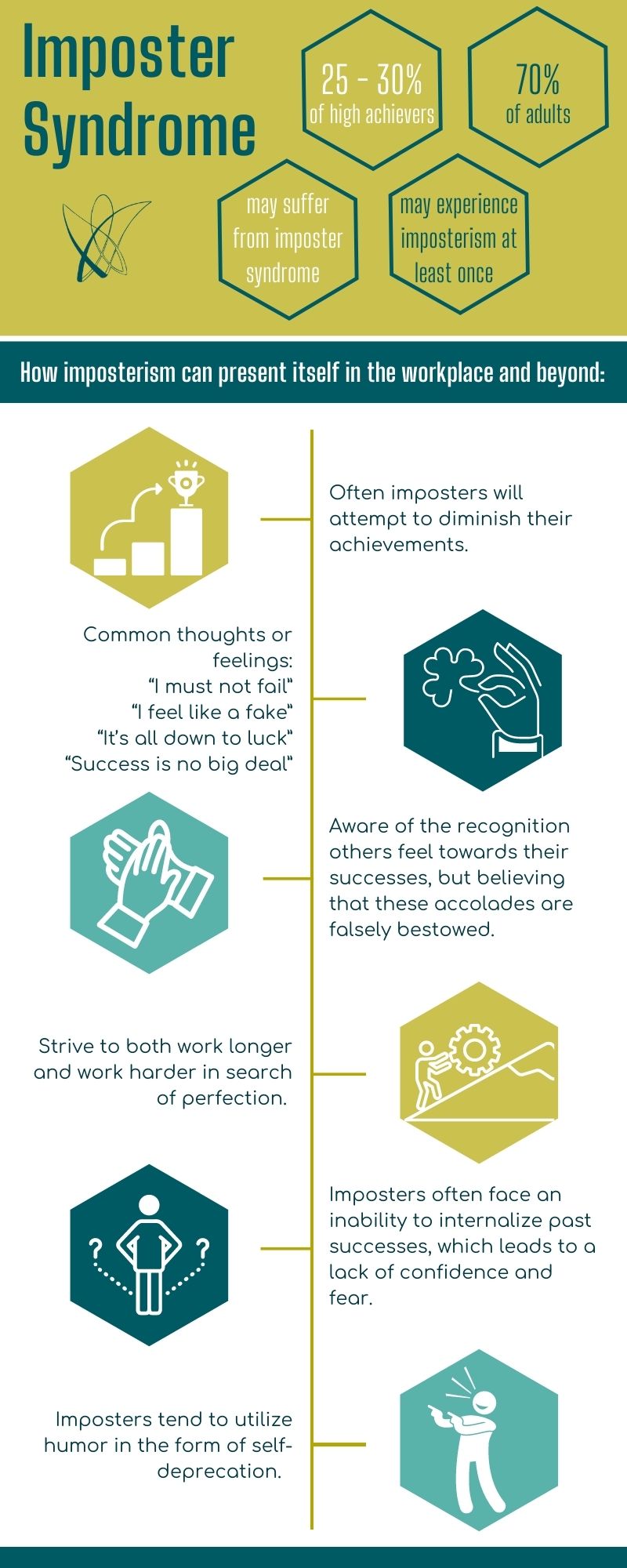The Struggle to Internalize Success
Part 1 of our Leadership Transition Series
Shortened Version


„Some years ago, I was lucky enough to be invited to a gathering of great and good people: artists and scientists, writers and discoverers of things. And I felt that at any moment they would realise that I didn’t qualify to be there, among these people who had really done things.
On my second or third night there, I was standing at the back of the hall, while a musical entertainment happened, and I started talking to a very nice, polite, elderly gentleman about several things, including our shared first name. And then he pointed to the hall of people, and said words to the effect of, ‘I just look at all these people, and I think, what the heck am I doing here? They’ve made amazing things. I just went where I was sent.’
And I said, ‘Yes. But you were the first man on the moon. I think that counts for something.’
And I felt a bit better. Because if Neil Armstrong felt like an imposter, maybe everyone did. Maybe there weren’t any grown-ups, only people who had worked hard and also got lucky and were slightly out of their depth, all of us doing the best job we could, which is all we can really hope for.“
To preface this article, we have to make a clear distinction between Imposter Syndrome and feelings of Imposterism. Although leadership language and articles often refer to ‘Imposter Syndrome’, this language is not precisely correct. What is often referred to as Imposter Syndrome is instead Feelings of Imposterism (FOI). Let us be clear:
Imposter Syndrome is a serious, psychological condition that is best handled by professional psychologists. Those with Imposter Syndrome suffer through chronic feelings of intellectual fraudulence that override any feelings of success or external proof of confidence (Gill Corkindale, 2008). It is also by no means uncommon, especially among the academic and business elite. It is estimated that between 25-30% of high-achieving individuals may suffer from Imposter Syndrome. If, after reading this article, you believe you might be suffering from Imposter Syndrome and not feelings of Imposterism – please seek professional help.
In a milder form, Feelings of Imposterism (FOI) on the other hand are much more common. A study conducted in 2011 found that almost 70% of all adults experience feelings of Imposterism at some point during their life (Sakulku & Alexander, 2011). So, it should not come as a surprise that many of our clients at MagnoliaTree – all of whom are senior executives and decision makers of strategy – suffer from this struggle to internalize success. What is surprising however, is how few of our clients know about FOI, its effects, and how to overcome it. This piece will focus heavily on the latter condition: temporary FOI associated with taking on new roles, transitioning to a new company, or during a period of crisis.

So, what is Imposter Synrome?
While many of the initial studies into imposter syndrome examined primarily women, contemporary research has revealed that imposter syndrome affects men and women equally and is likely associated with perfectionism. Recent studies suggest that between 25-30% of high achievers may suffer from imposter syndrome and around 70% of adults may experience Imposterism at least once in their lifetime. (Sakulku & Alexander, 2011) That is to say, FOI is by no means rare, and you should not feel alone or isolated by the experience.

FOI is especially prevalent as we take on new roles, or challenges. This is especially true during the current global pandemic, where many of us have had to transition into radically new work structures. In the words of Kets de Vries (2005), “To some extent, of course, we are all imposters. We play roles on the stage of life, presenting a public self that differs from the private self we share with intimates and morphing both selves as circumstances demand. Displaying a façade is part and parcel of the human condition.” Imposterism is a natural part of life and it should be treated as such. The feelings of inadequacy we face in new roles, or facing new challenges, can be overwhelming but are also often temporary. Fortunately, there are many proven methods of dealing with Imposterism revealed by psychologists and experienced professionals exploring Imposter Syndrome.
The unintended consequence of Imposter Syndrome and Imposterism
The psychological consequences of Imposter Syndrome can be severe. Although Imposter Syndrome is not an official psychological diagnosis in the Diagnostic and Statistical Manual of Mental Disorders (DSM), it is often associated with anxiety, depression, and perfectionism.

Both Imposter Syndrome and Imposterism can also have significant motivational and performance consequences in the workplace. FOI sufferers internalize failure a lot more than positive feedback. They undervalue wins, while overvaluing failures. FOI can lead to a vicious cycle of perfectionism, wherein the subject strives for perfection and as a result drags out deadlines. These delays raise concerns amongst leadership, which is then internalized by the sufferer finds themself facing greater self-doubt which in turn fuels even higher levels of perfectionism leading to a downward spiral.
How to deal with Feelings of Imposterism
Here is a compiled list of methods by which you can resolve FOI:

- The first step, and perhaps most important, is to recognize that you are experiencing imposter feelings. From there onward, you can consider how to deal with these feelings.
- Seek support. Needing help is natural, everything doesn’t have to be done alone. A coach and a mentor are great pathfinders in helping you navigate through these emotions. A simple step to alleviating feelings of Imposterism is to talk. Seek out your coach, mentors, friends, and family and explain the situation. Often, getting the issue off your chest can help take off some of the anxiety and pressure you are experiencing.
- The next step is to contextualize the imposter feelings you are facing, ideally together with a trusted advisor. Have you experienced a new challenge, and new career, or some other shift that is causing these feelings of Imposterism? What is the source of these feelings? Feeling useless right now is not the same as being useless.
- If the source of your Imposterism is a failure, reframe your experience as a learning opportunity. Be kind to yourself. Mistakes are normal, especially in a new and challenging environment. Use your failures as a chance to grow.
- Lastly, seek ongoing feedback and support. Don’t attempt to do everything by yourself, especially in a new position. This will only result in feeling overwhelmed and unable to cope with the situation, which can intensify the feeling of being an ‘imposter’.
For people leaders in the workplace, here are additional opportunities to institute organization wide programs to deal with FOI:

- Consider instituting a program to help others deal with their own feelings of Imposterism. Both California Technology and MIT have instituted programs to debunk myths about belonging and help students to identify Imposter Syndrome tendencies. Many universities include counseling workshops to help students identify their strengths, deal with failures, and understand perfectionism to set more reasonable expectations for themselves (Cokely, 2013). Consider doing the same in your office.
- Huffstutler and Varnell (2004) also encourage the development of peer group programs, mentoring opportunities, and identification of organizational expectations, especially those that produce high levels of anxiety.
- They also recommend instituting a system of mentors to help new employees and long-term employees alike adapt to new challenges.
- Other recommendations have included the implementation of multifaceted structured feedback systems (Cogner & Fulmer, 2004),



